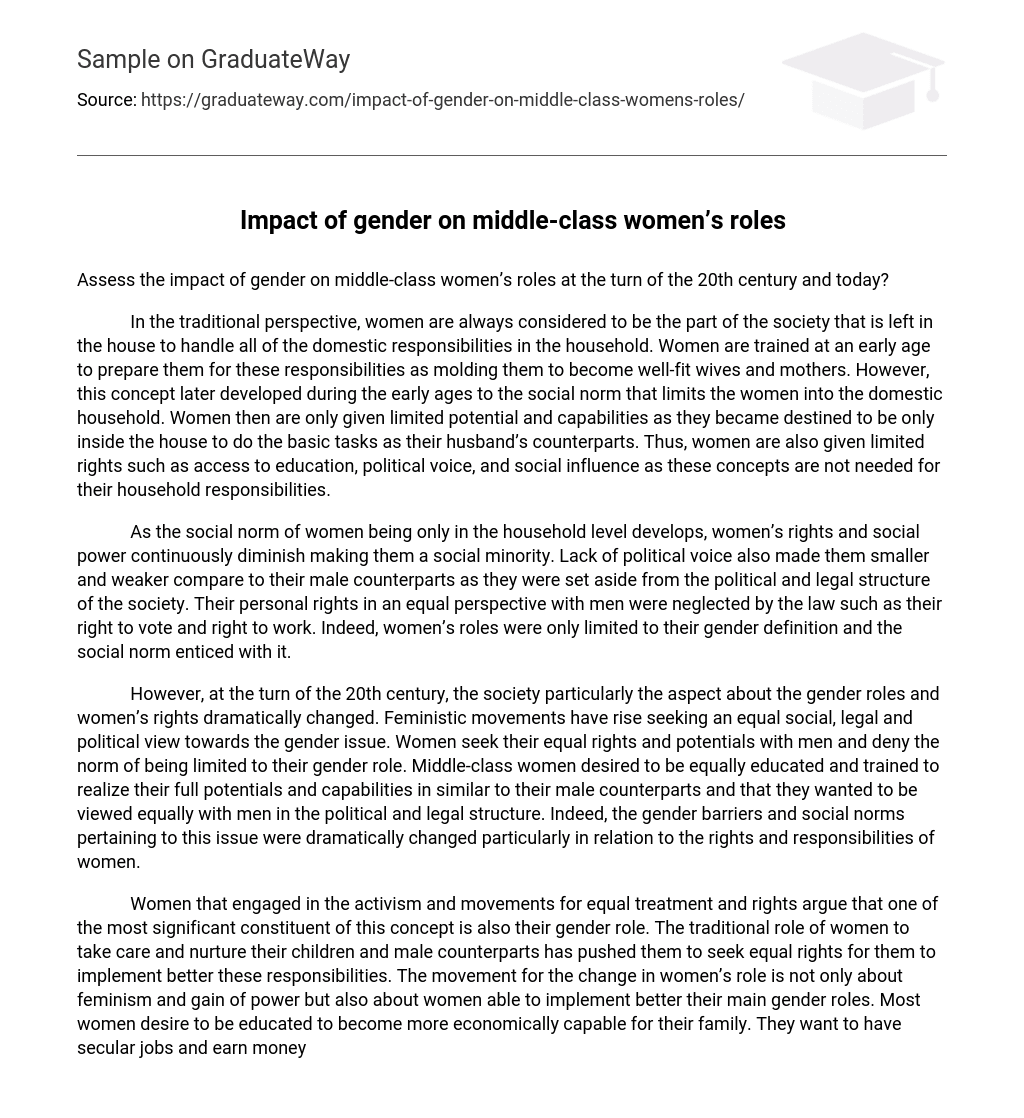Assess the impact of gender on middle-class women’s roles at the turn of the 20th century and today?
In the traditional perspective, women are always considered to be the part of the society that is left in the house to handle all of the domestic responsibilities in the household. Women are trained at an early age to prepare them for these responsibilities as molding them to become well-fit wives and mothers. However, this concept later developed during the early ages to the social norm that limits the women into the domestic household. Women then are only given limited potential and capabilities as they became destined to be only inside the house to do the basic tasks as their husband’s counterparts. Thus, women are also given limited rights such as access to education, political voice, and social influence as these concepts are not needed for their household responsibilities.
As the social norm of women being only in the household level develops, women’s rights and social power continuously diminish making them a social minority. Lack of political voice also made them smaller and weaker compare to their male counterparts as they were set aside from the political and legal structure of the society. Their personal rights in an equal perspective with men were neglected by the law such as their right to vote and right to work. Indeed, women’s roles were only limited to their gender definition and the social norm enticed with it.
However, at the turn of the 20th century, the society particularly the aspect about the gender roles and women’s rights dramatically changed. Feministic movements have rise seeking an equal social, legal and political view towards the gender issue. Women seek their equal rights and potentials with men and deny the norm of being limited to their gender role. Middle-class women desired to be equally educated and trained to realize their full potentials and capabilities in similar to their male counterparts and that they wanted to be viewed equally with men in the political and legal structure. Indeed, the gender barriers and social norms pertaining to this issue were dramatically changed particularly in relation to the rights and responsibilities of women.
Women that engaged in the activism and movements for equal treatment and rights argue that one of the most significant constituent of this concept is also their gender role. The traditional role of women to take care and nurture their children and male counterparts has pushed them to seek equal rights for them to implement better these responsibilities. The movement for the change in women’s role is not only about feminism and gain of power but also about women able to implement better their main gender roles. Most women desire to be educated to become more economically capable for their family. They want to have secular jobs and earn money for the financial aspect of their family making them able to also provide for their children and husbands. In the political aspects, women also wanted to gain access and exercise their own individual rights and privileges in the political structure to promote the condition of the society they belong. As they have silently witnessed the problems and turmoil in the society, women wanted to become involve in the political and social system to promote the rights of their families and help their male counterparts. These ideology and principles of the women as related with their gender roles has pushed them to make a change in the role of women in the society.
Women’s roles have dramatically changed after the turn of the 20th century. The traditional view of women being only in the household has almost been completely erased in the society as women now are already acceptable in all of the social structure system. Some even dominant the world that traditional has only men in it. Of the most significant reason for these changes is the aspect of gender role of the women that most seek to implement and promote this better through gaining more capabilities in different fields. Contrary to the traditional setting, women of the present world have now been given more responsibilities such as their respective families, their male counterparts, their fellow women, and the condition of the society as a whole.





